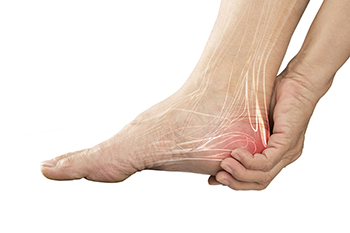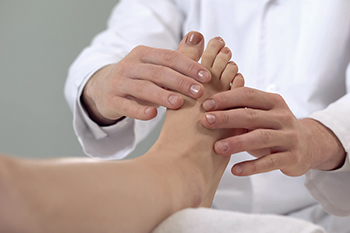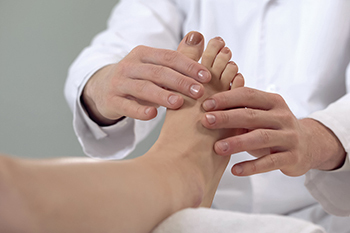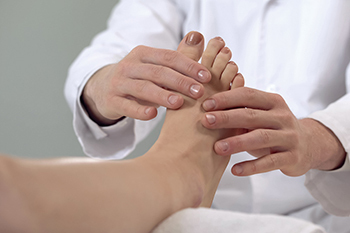Connect With Us
Blog
Items filtered by date: September 2022
Causes and Symptoms of Plantar Fasciitis

Plantar fasciitis is the most common cause of heel pain. This condition is the inflammation of the tough band of tissue, called the plantar fascia, that runs along the sole of the foot from toes to heel. This tissue helps support the arch and plays an important role in foot mechanics when walking. Causes of plantar fasciitis include standing or walking for long periods, heel spurs, pregnancy, and obesity. Wearing shoes with little or no cushioning in the heel and sole, as well as walking barefoot, may also contribute to the inflammation. The pain of plantar fasciitis is usually a stabbing sensation, felt most in the heel. It tends to be worse upon awakening or after prolonged activity. When pressure is placed on the arch of the foot, pain increases. A feeling of tightness in the calf muscles is another indicator of plantar fasciitis. Luckily, there are a number of remedies for plantar fasciitis. For more information, please make an appointment with a podiatrist.
Plantar fasciitis is a common foot condition that is often caused by a strain injury. If you are experiencing heel pain or symptoms of plantar fasciitis, contact one of our podiatrists from Sutera and Jones Surgical Podiatry. Our doctors can provide the care you need to keep you pain-free and on your feet.
What Is Plantar Fasciitis?
Plantar fasciitis is one of the most common causes of heel pain. The plantar fascia is a ligament that connects your heel to the front of your foot. When this ligament becomes inflamed, plantar fasciitis is the result. If you have plantar fasciitis you will have a stabbing pain that usually occurs with your first steps in the morning. As the day progresses and you walk around more, this pain will start to disappear, but it will return after long periods of standing or sitting.
What Causes Plantar Fasciitis?
- Excessive running
- Having high arches in your feet
- Other foot issues such as flat feet
- Pregnancy (due to the sudden weight gain)
- Being on your feet very often
There are some risk factors that may make you more likely to develop plantar fasciitis compared to others. The condition most commonly affects adults between the ages of 40 and 60. It also tends to affect people who are obese because the extra pounds result in extra stress being placed on the plantar fascia.
Prevention
- Take good care of your feet – Wear shoes that have good arch support and heel cushioning.
- Maintain a healthy weight
- If you are a runner, alternate running with other sports that won’t cause heel pain
There are a variety of treatment options available for plantar fasciitis along with the pain that accompanies it. Additionally, physical therapy is a very important component in the treatment process. It is important that you meet with your podiatrist to determine which treatment option is best for you.
If you have any questions, please feel free to contact one of our offices located in Media, Glen Mills, Riddle Memorial Hospital, and Concordville, PA . We offer the newest diagnostic and treatment technologies for all your foot care needs.
Shockwave Therapy May Help Plantar Fasciitis

The plantar fascia is located on the bottom of the foot, and connects the heel to the toes. Inflammation of the plantar fascia can cause a condition that is known as plantar fasciitis which may happen from repeated stress as a result of participating in running and jumping activities. It can affect the heel, and it is often difficult to walk. There is a treatment method that is referred to as shockwave therapy, and it may be useful in healing plantar fasciitis. It is performed by administering shockwaves to the affected area, which is typically painless. Patients are generally required to undergo three to five treatments, and relief may be found soon after it begins. Research has indicated results may be seen more quickly when it is diagnosed in the beginning stages. If you suffer from plantar fasciitis, it is suggested that you consult with a podiatrist who can determine if this is an effective form of treatment for you.
Shockwave therapy is a treatment commonly used to treat various injuries and conditions, particularly plantar fasciitis in the feet. To learn more, consult with one of our podiatrists from Sutera and Jones Surgical Podiatry. Our doctors can provide the care you need to keep you pain-free and on your feet.
Shockwave Therapy
Shockwave therapy is a new treatment option designed to treat bone conditions such as tennis elbow, shoulder pain, and others. Shockwave therapy uses high intensity sound waves that are directed to the affected tissues of the body with pinpoint accuracy. The effects are very beneficial, leading to a production of collagen fibers, eliminating inflammation.
Who Benefits from Shockwave?
Shockwave is recommended for patients suffering from heel pain and associated problems. Heel pain is a common condition which can be caused by obesity, overexertion, and spending a substantial amount of time on hard floors with your feet exposed and unsupported.
Fast and Easy
The therapy is actually a simple process that can leave patients feeling better the very next day. Shockwave therapy is not as dramatic as it sounds. It enables more blood flow to effected areas, addressing the source of the problem and allowing treatment to last for a long time.
Treatment & Recovery Time
Shockwave treatment will enable your feet to recover quickly. This is especially important since surgery is not required. It is cost effective and does not require the use of anesthesia. This treatment is a better option to surgery, since it is proven safe.
If you have any questions, please feel free to contact one of our offices located in Media, Glen Mills, Riddle Memorial Hospital, and Concordville, PA . We offer the newest diagnostic and treatment technologies for all your foot and ankle needs.
The Benefits of Custom Orthotics

Orthoses, commonly called orthotics, are inner soles that are placed in the shoes. Some types are prefabricated and available for purchase in retail stores, and others are custom-made by a podiatrist. Research has shown that custom orthotics are generally more helpful in reducing foot pain and correcting other foot issues. If you have tried store-bought orthotics and are not finding relief, it may be time to consult a podiatrist. A foot examination may include testing the range of motion, muscle strength, and bone structure. Your walking pattern, which is known as the gait, will be assessed, along with a discussion of what may be causing the pain you are experiencing. Other factors, such as the type of shoes that are worn, lifestyle choices, activities, and work conditions will be considered. A cast or scan is then taken, and the orthotic is crafted specifically for your foot. This may address toe and foot deformities, arch problems, gait abnormalities, and heel problems. For more information on custom orthoses, please consult a podiatrist.
If you are having discomfort in your feet and would like to try orthotics, contact one of our podiatrists from Sutera and Jones Surgical Podiatry. Our doctors can provide the care you need to keep you pain-free and on your feet.
What Are Orthotics?
Orthotics are inserts you can place into your shoes to help with a variety of foot problems such as flat feet or foot pain. Orthotics provide relief and comfort for minor foot and heel pain but can’t correct serious biomechanical problems in your feet.
Over-the-Counter Inserts
Orthotics come in a wide variety of over-the-counter inserts that are used to treat foot pain, heel pain, and minor problems. For example, arch supports can be inserted into your shoes to help correct overarched or flat feet, while gel insoles are often used because they provide comfort and relief from foot and heel pain by alleviating pressure.
Prescription Orthotics
If over-the-counter inserts don’t work for you or if you have a more severe foot concern, it is possible to have your podiatrist prescribe custom orthotics. These high-quality inserts are designed to treat problems such as abnormal motion, plantar fasciitis, and severe forms of heel pain. They can even be used to help patients suffering from diabetes by treating foot ulcers and painful calluses and are usually molded to your feet individually, which allows them to provide full support and comfort.
If you are experiencing minor to severe foot or heel pain, it’s recommended to speak with your podiatrist about the possibilities of using orthotics. A podiatrist can determine which type of orthotic is right for you and allow you to take the first steps towards being pain-free.
If you have any questions please contact one of our offices located in Media, Glen Mills, Riddle Memorial Hospital, and Concordville, PA . We offer the newest diagnostic and treatment technologies for all your foot and ankle needs.
Are Bunions Affecting Your Everyday Life?
Foot and Ankle Injuries in Ballet Dancers

Foot and ankle injuries are sometimes an unavoidable part of a dancer’s life, and particularly so for ballet dancers. Overuse injuries are more common in ballet than traumatic injuries, as they can be attributed to repetitive movements and extraordinary stress on bones and soft tissue structures. Achilles tendinopathy is one example of this type of injury. This is often the result of excessive stress on the Achilles tendon due to exaggerated positions such as demi-plié, demie point, and en pointe. Flexor hallucis longus tendinopathy is an overuse injury that can occur from repeated pushing off from the big toe. The pirouettes ballet dancers perform put an incredible amount of pressure on the forefoot, which can cause a nerve disorder called Morton’s neuroma. Landing after jumps and rolling the foot down from demie point places repeated tension on the plantar fascia tissue on the sole of the foot. This can cause the tissue to become inflamed or torn (plantar fasciitis). A podiatrist has immeasurable experience in diagnosing and treating foot and ankle conditions of all kinds, and should be consulted for any such injury a dancer or athlete may incur.
Ankle and foot injuries are common among athletes and in many sports. They can be caused by several problems and may be potentially serious. If you are feeling pain or think you were injured in a sporting event or when exercising, consult with one of our podiatrists from Sutera and Jones Surgical Podiatry. Our doctors will assess your condition and provide you with quality foot and ankle treatment.
Common Injuries
The most common injuries that occur in sporting activities include:
- Achilles Tendonitis
- Achilles Tendon Rupture
- Ankle Sprains
- Broken Foot
- Plantar Fasciitis
- Stress Fractures
- Turf Toe
Symptoms
Symptoms vary depending upon the injury and in some cases, there may be no symptoms at all. However, in most cases, some form of symptom is experienced. Pain, aching, burning, bruising, tenderness, tightness or stiffness, sensation loss, difficulty moving, and swelling are the most common symptoms.
Treatment
Just as symptoms vary depending upon the injury, so do treatment options. A common treatment method is known as the RICE method. This method involves rest, applying ice, compression and elevating the afflicted foot or ankle. If the injury appears to be more serious, surgery might be required, such as arthroscopic or reconstructive surgery. Lastly, rehabilitation or therapy might be needed to gain full functionality in the afflicted area. Any discomfort experienced by an athlete must be evaluated by a licensed, reputable medical professional.
If you have any questions, please feel free to contact one of our offices located in Media, Glen Mills, Riddle Memorial Hospital, and Concordville, PA . We offer the newest diagnostic and treatment technologies for all your foot care needs.
Blog Archives
- March 2025
- February 2025
- January 2025
- December 2024
- November 2024
- October 2024
- September 2024
- August 2024
- July 2024
- June 2024
- May 2024
- April 2024
- March 2024
- February 2024
- January 2024
- December 2023
- November 2023
- October 2023
- September 2023
- August 2023
- July 2023
- June 2023
- May 2023
- April 2023
- March 2023
- February 2023
- January 2023
- December 2022
- November 2022
- October 2022
- September 2022
- August 2022
- July 2022
- June 2022
- May 2022
- April 2022
- March 2022
- February 2022
- January 2022
- December 2021
- November 2021
- October 2021
- September 2021
- August 2021
- July 2021
- June 2021
- May 2021
- April 2021
- March 2021
- February 2021
- January 2021
- December 2020
- November 2020
- October 2020
- September 2020
- August 2020
- July 2020
- June 2020
- May 2020
- April 2020
- March 2020
- February 2020
- January 2020
- December 2019
- November 2019
- October 2019
- September 2019
- August 2019
- July 2019
- June 2019
- May 2019
- April 2019
- March 2019
- February 2019
- January 2019
- December 2018
- November 2018
- October 2018
- September 2018
- August 2018
- July 2018
- June 2018
- May 2018
- April 2018
- March 2018
- February 2018
- January 2018
- December 2017
- November 2017
- October 2017
- September 2017
- August 2017
- July 2017
- June 2017
- May 2017
- April 2017
- March 2017
- February 2017
- January 2017
- December 2016
- November 2016
- October 2016
- September 2016
- August 2016
- July 2016
- June 2016
- May 2016
- April 2016
- March 2016
- February 2016
- January 2016
- December 2015
- November 2015
- October 2015
- September 2015
- August 2015
- July 2015
- June 2015
- May 2015
- April 2015
- March 2015
- February 2015
- January 2015
- December 2014
- November 2014
- October 2014
- September 2014

